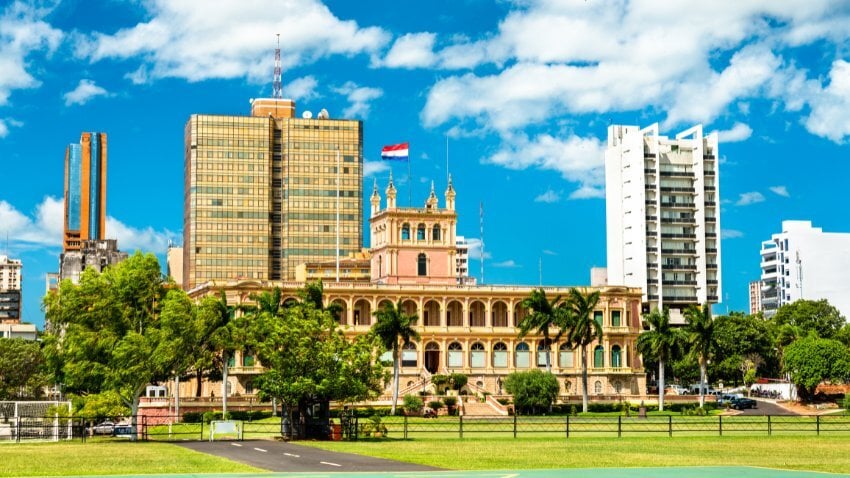Nayib Bukele: The Man That Made El Salvador Safe Again
A decade ago, El Salvador was known as one of the most dangerous countries in the world. In 2015, it had the world’s highest homicide rate. Gangs...

3 min read
For years, Uruguay’s passport system was broken, especially for naturalized citizens. If you were born abroad but became a Uruguayan citizen, your passport could prevent you from travelling freely.
Thankfully, that’s finally changing. In April 2025, Uruguay’s Ministry of the Interior rolled out a critical update, correcting a bureaucratic error that had rendered thousands of passports useless for travel purposes. The move is a major win for expats, investors, and anyone who chose to live in Uruguay but was stuck in legal limbo.
In this article, we will delve into the details surrounding the Uruguayan passport for naturalized citizens, the first passport issued, and what is still missing in the country’s legislation to guarantee a secure second passport for those who choose to make Uruguay their home.

Uruguay updated its passports to show only “Nationality: URY,” removing place of birth. However, its constitution still distinguishes natural-born from naturalized citizens, so full legal equality awaits reform
Unlike every other country in the world, Uruguay had a unique way of handling the passports of naturalized citizens. Instead of listing their nationality as Uruguayan, the government incorrectly displayed their country of birth, or left the field blank entirely.
Why? A mistranslation in Uruguay’s interpretation of ICAO (International Civil Aviation Organization) guidelines. The Spanish version used the word "nacionalidad" (nationality) instead of "ciudadanía" (citizenship), leading to years of confusion.
This problem affected an estimated 16,000 naturalized citizens, with around 1,500 new legal citizens facing the same hurdle each year. Many encountered travel disruptions, including detentions at borders and unexpected visa requirements in countries where Uruguayan citizens typically enjoy visa-free access.
Gulnor Saratbekova, a woman originally from Tajikistan, has lived in Uruguay for over 20 years. When she became a Uruguayan citizen, she relinquished her Tajik passport because Tajikistan doesn’t permit dual nationality. But because her Uruguayan passport listed Tajikistan as her nationality, not Uruguay, she was effectively stateless.
Gulnor's passport, which only listed the country of her birth, now lists her as a Uruguayan citizen. She is no longer stateless and confined to the country where she resides, as her passport now contains the necessary information to travel freely wherever she chooses.
She described to El Observador that she felt like she had “a father and mother, neither of whom recognized her as a child.” She had all the legal rights of a citizen—she could vote, work, and live—but she could not travel freely.
This is not a unique story. Similar issues have triggered cases before the Inter-American Commission on Human Rights, which has viewed them as potential violations of the right to nationality and identity.
Although Uruguay has made important changes to its passports, the underlying issue has not yet been fully resolved. Recently, the Uruguayan government updated its passport format to comply with international standards set by the International Civil Aviation Organization (ICAO). From now on, all passports issued to Uruguayan citizens display only the field "Nationality/Citizenship" with the code "URY" — the international designation for Uruguay — regardless of the citizen’s place of birth or origin.
Additionally, the “Place of Birth” field has been removed. These updates were crucial in addressing practical challenges faced by naturalized citizens — individuals born outside of Uruguay who obtained Uruguayan citizenship through legal processes. Previously, these citizens often encountered difficulties while travelling abroad, as their passports could trigger suspicion or discrimination at international borders and with airline staff due to the visible distinction in their personal data.
However, this passport reform is only an administrative fix — it does not resolve the deeper legal and constitutional issue. Uruguay’s Constitution still makes a formal distinction between two categories of citizens: natural citizens, who are born in Uruguay or are the children or grandchildren of Uruguayans, and naturalized citizens, who are foreign-born individuals who have legally acquired Uruguayan citizenship. This distinction goes beyond terminology; it has legal and symbolic consequences. It means that naturalized citizens, while fully legal, are not granted the same constitutional recognition or potentially the same rights as natural citizens. In essence, they are treated as second-tier citizens under the law.
In response, the National Human Rights Institution of Uruguay is advocating for a constitutional reform to eliminate this disparity. They aim to ensure that all citizens, regardless of how or where they acquired their citizenship, are recognized equally under the law, with the same rights and legal status.
For now, thousands of naturalized Uruguayans can finally travel freely without facing unnecessary scrutiny. But the broader struggle for full legal and constitutional recognition continues. The passport change is an important step forward — yet the journey toward true legal equality and inclusion is still ongoing.

Mikkel, breakfast in Uruguay: citizenship may hide rights gaps, always read the fine print. Uruguay updated its passports, but it must reform its constitution for true equality
If you’re an expat or considering becoming one, let Uruguay serve as a powerful reminder: always look under the hood. Just because a country offers a path to citizenship does not mean it gives you all the rights that should come with it. Read the fine print. Ask the tough questions. And don’t assume your passport will work the way you think it will.
At Expat Money, we help our clients avoid these types of traps because freedom of movement is not just about hopping on a plane; it's about having the flexibility to live and work anywhere. It’s about having a legal identity that is recognized, respected, and free from loopholes that can compromise your mobility.
Uruguay’s done the right thing—finally. But until they update their Constitution to reflect reality, the fight isn’t over.
If you’re looking at building your Plan-B, take your first step by downloading our free special report on Plan-B Residencies & Instant Citizenships.

If you want the best intel from the expat world, including profitable offshore opportunities, little-known tax-saving strategies, and hard-won insights on immigration, passports, and Plan-B residencies, all delivered to your inbox every single week, then join our daily correspondence, EMS Pulse®. Currently enjoyed by over 84,000 expats and expat-hopefuls worldwide. Fill in the form below to join our newsletter free:

Written by Mikkel Thorup
Mikkel Thorup is the world’s most sought-after expat consultant. He focuses on helping high-net-worth private clients to legally mitigate tax liabilities, obtain a second residency and citizenship, and assemble a portfolio of foreign investments including international real estate, timber plantations, agricultural land and other hard-money tangible assets. Mikkel is the Founder and CEO at Expat Money®, a private consulting firm started in 2017. He hosts the popular weekly podcast, the Expat Money Show, and wrote the definitive #1-Best Selling book Expat Secrets - How To Pay Zero Taxes, Live Overseas And Make Giant Piles Of Money, and his second book: Expats Guide On Moving To Mexico.

A decade ago, El Salvador was known as one of the most dangerous countries in the world. In 2015, it had the world’s highest homicide rate. Gangs...

For those seeking legal residency in a foreign country without needing a significant upfront investment, the Job Seeker Visa presents a strategic...

Let me put this bluntly: Paraguay is one of the best-kept secrets in Latin America. While the world fixates on chaos and political circus acts in...